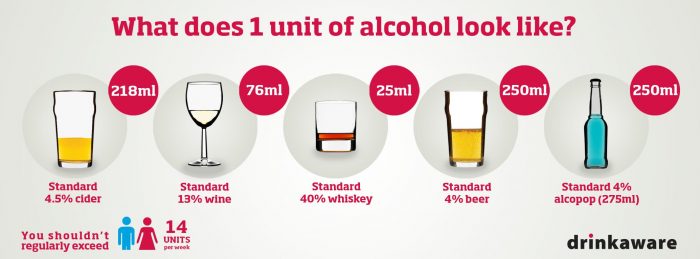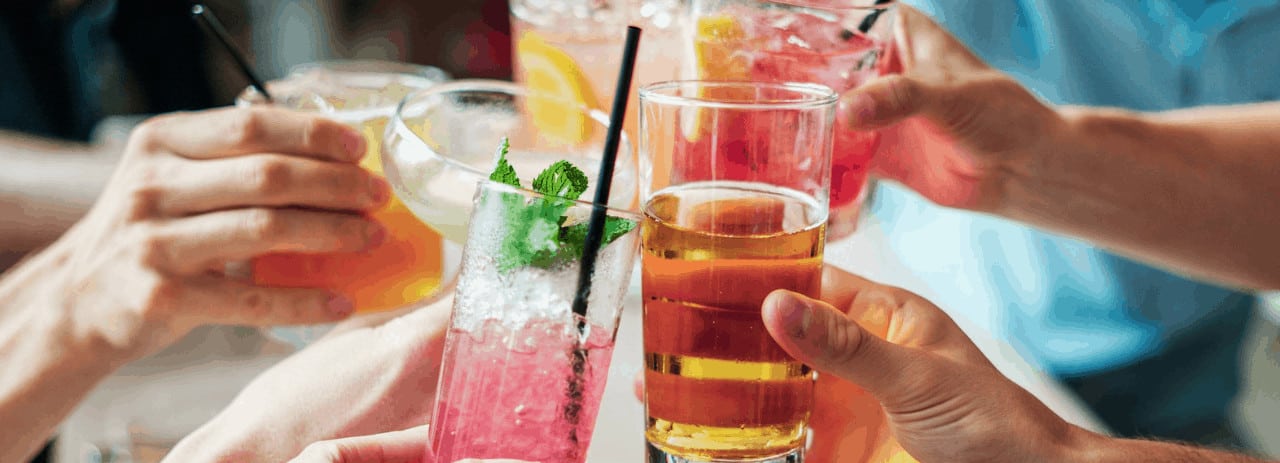Tag: Dry January
Dry January grows in popularity year on year.
The campaign by Alcohol Change UK, encourages participants to give up alcohol for the entire month of January.
The dry January one-month booze-free challenge can have a significantly positive impact on your health.
Alcohol has proven to increase the risk of developing a range of health problems (including cancers of the mouth, throat and breast) and that risk increases the more you drink on a regular basis.
Ruth Kander, our dietitian, looks at what is considered a safe amount of alcohol consumption.
The UK Chief Medical Officers’ (CMOs) guideline for keeping health risks from alcohol to a low level for both men and women states that:
- It is safest not to drink more than 14 units a week on a regular basis.
- Regularly drinking as much as 14 units per week, it’s best to spread your drinking evenly over three or more days.
– If you have one or two heavy drinking episodes a week, you increase your risk of death from long-term illness and injuries. - Cutting down the amount you drink, a smart way to help achieve this is to have several drink-free days a week.
A useful website for more information about alcohol is www.drinkaware.co.uk
What is a unit of alcohol?

How long does alcohol stay in your body?
On average, it takes about one hour for your body to break down one unit of alcohol, however, this can vary, depending on:
- Your weight
- Whether you’re male or female
- Your age
- Your metabolism – how quickly or slowly your body turns food into energy
- How much food you have eaten
- The type and strength of the alcohol you have consumed
- Whether you’re taking medication and, if so, what type
- It can also take longer if your liver isn’t functioning normally
If I am on medicines can I drink alcohol?
People taking sedative drugs (like diazepam/valium) or antidepressants (like fluoxetine/Prozac) should avoid alcohol altogether.
There are some antibiotics; metronidazole and tinidazole which just do not mix with alcohol – drinking with these will make you sick. But for most commonly prescribed antibiotics, drinking is unlikely to cause problems so long as it is within the low-risk alcohol unit guidelines.
People taking long-term medications should be careful about drinking, as alcohol can make some drugs less effective and long-term conditions could get worse. Examples of long-term medications include drugs for epilepsy, diabetes, or drugs like warfarin to thin the blood.
(From www.drinkaware.co.uk)
What are the consequences of drinking too much alcohol?
- Low mood/mood swings
- Liver problems
- Heart problems
- Cancers (mouth, tongue, throat, oesophagus)
- Weight gain
- Poor sleep
- Blood pressure instability
By Ruth Kander BSc(Hons)RD | Dietitian
If you wish to discuss ways to maintain a healthy diet and reduce your alcohol consumption, Ruth holds a virtual clinic every Friday from 9am-2pm. Please call our reception team on 020 7353 5678 if you would like to request a face-to-face appointment
So Veganuary and Dry January are over… what happens next?
With your January healthy challenges over, you may be feeling healthier and refreshed knowing you have managed to stay vegan and/ or teetotal for 1 month. For some of you these new eating and drinking habits are here to stay but for many of you, it is now time to reintroduce meat and alcohol back into your diet safely.
A key theme to remember is everything in moderation!
What you eat and drink forms the backbone of maintaining a healthy lifestyle, which should always be the goal of any dietary alterations. Everyone’s dietary needs are different depending on their age, size and activity so there are no concrete rules to follow.
Read my top tips on how to reintroduce food and drink safely back into your diet.
Veganuary Tips:
Plant proteins are low in fat and high in fibre which is great for your gut health and cholesterol so following Veganuary these should continue to play a key part in your diet.
It is important to reintroduce food gradually and to start light. For the first few weeks stick with a predominantly plant protein diet and begin by introducing eggs and dairy initially. Move on to poultry and fish as these are easier for the body to digest than red meat but are high in healthy proteins. You will get the benefit of high-quality proteins and you won’t be missing out on iron.
Red meat is not bad for your body in moderation but it is calorie dense and the body digests it slower than any other food group. Your body won’t be used to the high protein content of red meats at the moment so introduce them in small quantities at first, building up so not to aggravate your digestive system.
Dry January Tips:
With regards to alcohol, it’s always nice to have a glass of wine with a meal or to relax at the weekend. But moderation is key. Try to keep within the limits of 14 units a week for both males and females and have frequent alcohol-free days throughout the week. It is important to remember not to have 6 alcohol-free days and save all 14 units to be consumed in 1 day, spread the 14 unit out evenly across the week.
An example of responsibly consuming alcohol could look like:
Weekly Alcohol Plan |
|
| Monday | Alcohol-free |
| Tuesday | 1 medium glass wine or equivalent |
| Wednesday | 1 medium glass wine or equivalent |
| Thursday | Alcohol-free |
| Friday | 3 medium glass wine or equivalent |
| Saturday | 2 medium glass wine or equivalent |
| Sunday | Alcohol-free |
*175ml (Medium Glass) = 2 Units / 250ml (Large Glass) = 3 Units

Drinking alcohol on an empty stomach will make you hungrier and increases the likelihood of snacking and unhealthy eating. It is much more preferable to drink alcohol with a meal as eating will distract you and make you fuller meaning you’ll consume less alcohol.
By Ruth Kander BSc(Hons)RD | Dietitian
If you wish to discuss ways to maintain a healthy vegan diet or would like more advice on how to reintroduce food back into your diet, Ruth can help. You can book a dietetics appointment online.





